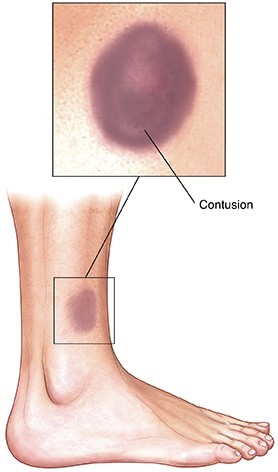The nurse is instructing a 3-year-old's mother regarding abnormal findings within the urinary system. Which assessment finding would the nurse document as normal finding for this age group?
Hematuria.
Enuresis.
Anuria.
Dysuria.
The Correct Answer is B
Enuresis. Enuresis is the involuntary discharge of urine after the age at which bladder control should have been established. It is a normal finding for children up to the age of 5 years. Hematuria, Anuria, and Dysuria are abnormal findings related to the urinary system and are not normal findings for a 3-year-old.
Choice A, Hematuria, is incorrect because it is an abnormal finding related to the urinary system.
Choice C, Anuria, is incorrect because it is an abnormal finding related to the urinary system.
Choice D, Dysuria, is incorrect because it is an abnormal finding related to the urinary system.
Nursing Test Bank
Naxlex Comprehensive Predictor Exams
Related Questions
Correct Answer is C
Explanation
Contusion. The nurse would suspect a contusion as the client was hit by a baseball bat and has localized pain and swelling with ecchymosis (bruising).

Option A, Strain, is unlikely as a strain is a stretching or tearing of a muscle or tendon, and it is not usually caused by blunt force trauma.
Option B, Sprain, is unlikely as a sprain is a stretching or tearing of a ligament, and it is not usually caused by blunt force trauma.
Option D, Fracture, is unlikely as a fracture is a break in the bone and usually involves more severe pain and may be accompanied by deformity.
Correct Answer is B
Explanation
In the Rinne test, the nurse first places a tuning fork on the mastoid process behind the ear, and when the client states that the sound is no longer heard, the tuning fork is placed beside the ear. This test is done to compare bone conduction with air conduction. When sound is no longer heard via bone conduction, the sound will still be heard via air conduction.
Choice A is incorrect because it describes the Weber test, not the Rinne test.
Choice C is incorrect because it is not a standard hearing test.
Choice D is incorrect because it describes the Whisper test, which is also used to test for hearing loss.
Whether you are a student looking to ace your exams or a practicing nurse seeking to enhance your expertise , our nursing education contents will empower you with the confidence and competence to make a difference in the lives of patients and become a respected leader in the healthcare field.
Visit Naxlex, invest in your future and unlock endless possibilities with our unparalleled nursing education contents today
Report Wrong Answer on the Current Question
Do you disagree with the answer? If yes, what is your expected answer? Explain.
Kindly be descriptive with the issue you are facing.
